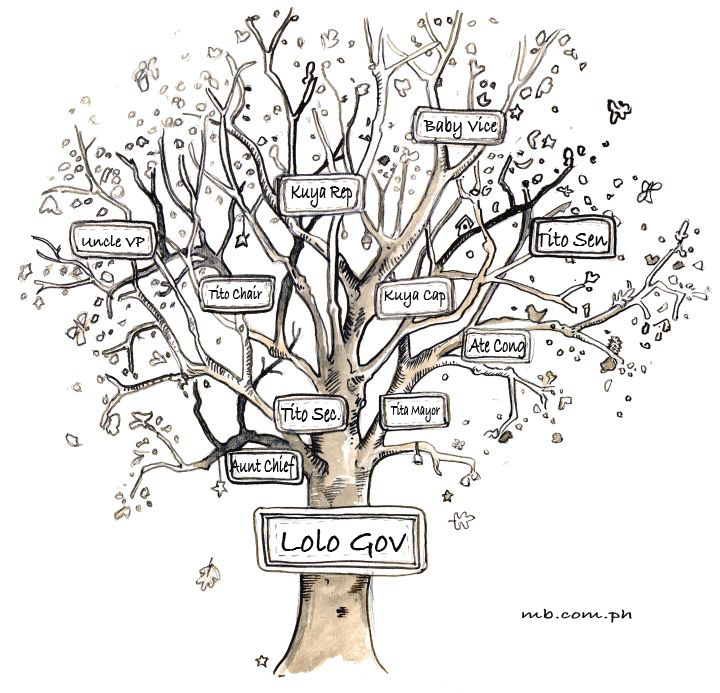Political dynasties, a dominant theme of every Philippine election
Political dynasties have become one of the dominant themes of every Philippine election since the end of Martial Law, but more so in the past decade. For the upcoming election on May 2019, many of the candidates, we see a lot of families running for public office.
READ: A trivia on political dynasties in the Philippines
Let’s take a look at the most popular candidates with family members running for office ?

In Davao
Duterte- For Congressman
Duterte – For Mayor
Duterte- For Vice Mayor
In SOCKSARGEN
Pacquiao- Congressman (Sarangani)
Pacquiao- Congressman (Party-list)
Pacquiao-Vice Mayor
Taguig
Cayetano- Senator
2 Cayetanos- Congressman
Cayetano – Mayor
Makati
Binay- Senator
Binay – Congressman
Binay vs Binay- Mayor
Cam Sur
Villafuerte- Governor
Villafuerte- Congressman
Villafuerte- Mayor
and many more.
Who among our candidates will put the interests of the country above those of their family?
The turnover of elective positions by end- termers to their heirs-apparent –spouses, children, or other relatives– helps preserve the dynasties. Elections are tilted in favor of the rich and celebrities and are inherently vulnerable to fraud. Elections provide the mechanism for conferring legitimacy to elite power and create the illusion once every three years that “change” is possible. Election computerization, touted as the means to “modernize democracy”, has been bugged by deficiencies, program errors, and transmission lapses.
“It’s what the people want. They want us to be the leaders” is the usual reason of being part of a political dynasty. They believe that it is their destiny to serve the Filipino people.
But I ask “Have you mentored potential leaders in your community so that they can lead or be legislators one day ?” I bet no. They just want them to be followers. I ask this question because my sister who is based in the USA, ran for council member position. She was mentored by former mayors to become a leader one day. My sister was the least political person in our family so I was surprised she became mayor for three terms in her city (A council member takes turns being mayor of the city). Sure, she loved to be part of community activities and the political leaders in her community groomed her to be a potential leader.
READ Vertical and horizontal expansion of political dynasties
The Philippine Center for Investigative Journalism (PCIJ) shares data of the Commission on Elections (Comelec) in the last five elections from 2004 to 2016. Most of the same families have dominated politics in the regions, cities, towns, and barangays, and consequently cornered and controlled vast sums of public funds. Politics is family in nearly all the 81 provinces. About 10,000 persons occupied 17,673 elective posts in six of the nation’s 20 vote-rich provinces. Positions of power from the local level to the halls of Congress were held simply by belonging to political clans that have continued to hold sway over communities large and small across the country for the last quarter of a century.
READ: PCIJ PRIMER: :Stats on the state of the regions: Who will rule? Send in the clans
A ban on political dynasties is supposedly one of items listed in the draft constitution for the shift to a federal system of government. A proposed ban on turncoatism, or candidates changing political parties between elections or during election campaigns is also included. The PCIJ report adds ” there are a few big ifs. Drafted by the 22-member Consultative Committee to Review the 1987 Constitution that President Rodrigo R. Duterte organized via an executive order, the proposed Charter has yet to be reviewed and certainly amended by Congress sitting as a Constituent Assembly (ConAss). Once approved in its possibly mangled glory, the draft will have to secure the vote of the 55-million or so registered Filipino voters.”
If the ban on political dynasties passes approval, all that it would prohibit is the succession and simultaneous holding of public office by members of the same family, up to the second degree of affinity or consanguinity (parents, children, siblings).
The catch is that the draft Charter, once approved in a plebiscite targeted for 2019, calls for the conduct of synchronized elections for all regional and federal positions in May 2022 — on a zero-sum game basis.
This means simply that old and new politicians, notably those from the about 200 political clans enduring, emerging, and lording over the nation’s 81 provinces could all run for a four-year term, and even get re-elected for another four.
And because all the same clan members could all run — and win as they most likely would — they could grab 10 more years of uninterrupted reign in their turfs during the 10-year transition period to federalism.
What can voters do now?
I will give a chance to new candidates.
Voting for new candidates is giving a chance for much needed laws to be passed. With the oligarchs-dominated Congress shooting down for the past 30 years all bills filed in compliance with the constitutional prohibition of political dynasties, reforming the reactionary institution of power remains an uphill battle. Expect the present and future congresses to enact more laws that will favor the oligarchs and corporate elite if members of these political dynasties are allowed to win.
The entrenchment of the system of political dynasties on a higher and blatant scale making the fair representation of the large majority of Filipinos even more elusive.
